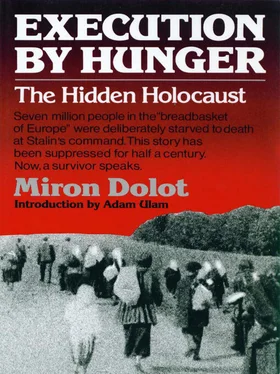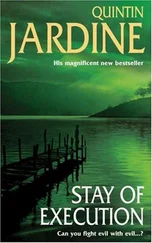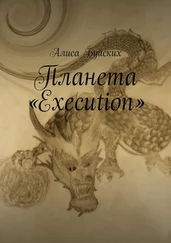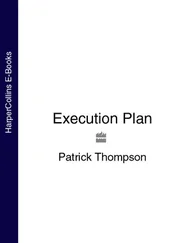Compared with other villagers, my family and I were in better shape to survive the winter. We had learned from the difficulties experienced during last spring’s famine to make extra preparations and to take special precautions to stay alive. Our main problem was how to hide the little food we had from the X-ray eyes of the officials. It was difficult to outwit them, but our survival instincts made us inventive.
The threat of imminent famine sharpened our minds; it freed us from the fear of being caught and made us ready to fight for our lives at any cost. While preparing for the long winter, we knew that we had to outsmart our persecutors if we wanted to stay alive.
Hiding food was not an easy task. The prospect of intolerable hunger forced us to take risks we would otherwise have never dared. After much worried thinking and discussion, our mother finally hit upon an idea: it was very simple, but extremely risky.
“Why not enlist the help of the government?” she remarked, as if it were obvious.
We did not understand what she had in mind.
“What do you mean?” I asked, completely baffled. “You mean to ask the government for help? You know that instead of helping us they have already taken everything we have!”
“No, not that,” she answered quietly, as was her way. “I mean we should hide whatever food we have in a pit on government land.”
We had to agree with her. It was an excellent idea. Its logic was clear: no official would even think of someone daring to hide food from the government on the government’s own land. Any personal use of government property was severely punished by law, but we dared to defy that law, and by doing it we saved our lives.
As we anticipated, the Bread Procurement Commission searched all over our backyard and garden, but did not bother to cross the boundary to the government property—the adjacent sand dunes.
During harvest time, my brother and I had not been idle. No matter how carefully the crop was guarded, we were able to collect enough wheat grain to sustain our lives until at least the next spring. We were agile young boys with nimble feet; we knew each path, each bush, and we knew how to avoid being caught. The only problem that remained was how to hide the grain. However, that problem had now been solved by our mother.
We buried some potatoes and grain in several places in a strip of land adjoining the woods. That land was a useless sandy dune overgrown by bushy willows and sallows so it was very easy for us to disguise our hiding places. In the winter, these hiding places were covered by snow, and we left them undisturbed. But when spring came and the snow melted, this hoard was our only means of existence. We would open our hiding places during the night, take out some potatoes and grain, enough for a few days, and then close and cover them up again. Our nightly visits to those hiding places are among my unforgettable experiences. Those potatoes and that grain were the greatest treasure that was ever hidden in the ground.
During the wintertime, we ate the food that was hidden elsewhere—in the tree hollows, for example, or in the roof thatching. We hid the grain in small bags in many places so as to be able to remove one bag at a time. Upon removing it, we immediately cooked and ate it. Both the cooking and the eating were done at night. We still had some potatoes, sauerkraut, and pickles which we received as advance payment in kind for our work in the kolhosp. This was our only solid food, but as days passed, these resources began to diminish rapidly, and we trembled at the thought that the commission might some day catch us eating our cooked wheat.
WE LOOKED toward the approaching winter of 1932–1933 with great trepidation, as if awaiting the arrival of the Judgment Day. It came with nature’s crushing wrath. The particularly severe winter conspired with the Communists against the farmers.
In our region, winter begins at the end of November when the heavy rains stop and the first frost sets in. The puddles freeze and the mud hardens. Heavy grayish white snow clouds chase each other across the sky.
This change of weather is accompanied by an icy east wind which blows along the valley and forces people to retreat into their shelters. It is the time when our villagers hurriedly finish their work in the fields and retire to their deserved winter rest. In the past, when the field work ended, our villagers were not forced to go out in bad weather. They would set aside enough food and firewood so that the cold days and nights indoors meant little hardship.
But the winter of 1932–1933 was different from any of the previous ones. Although nature followed her usual pattern with the exception of unusual cold, the life of the villagers did not take its normal course, for in step with the winter, a great famine approached.
The scarcity of food alarmed us as early as November while we were still working in the fields of the collective farm. The small advance received from the kolhosp had already been consumed. We had been told that we would receive more food as soon as the field work was completed. But we never did.
Then came the taxes. Taxes in the form of eggs and milk were obligatory only to those who owned fowl and cows. But each household had to meet a quota of meat, approximately 250 pounds annually, regardless of livestock holdings. Farmers without livestock were forced to pay this obligation to the state with money. Thus the annual earnings of a collective farmer from his work on the collective farm were insufficient to meet his obligations to the state, let alone for his subsistence.
However, even if the villagers had had money, it would have been impossible for them to purchase food. For, in fact, the trade in foodstuffs and other consumer commodities was officially prohibited. On November 6, 1932, the Council of People’s Commissars and the Central Committee of the Communist Party jointly issued the following resolution:
Because of the shameless breakdown of the grain collection campaign in various counties of Ukraine, the Council of People’s Commissars and the Central Committee of the Communist Party of Ukraine order the local Party and administration authorities to eradicate sabotage of grain, which has been organized by counterrevolutionary and kurkul elements. The opposition of a number of Communists, leaders of this sabotage, must also be stamped out, and the passive and indifferent attitude towards this sabotage on the part of some Party organizations must be liquidated. The Council of People’s Commissars and the Central Committee have decided to blacklist all those localities which conduct criminal sabotage and to apply against them the following reprisals:
1. To suspend the flow of all merchandise and all state and cooperative trade in these localities; to close all state and cooperative stores; and to remove all supplies of merchandise.
2. To prohibit trade in essential foodstuffs, which trade heretofore had been conducted by collective farms and individual homesteads.
3. To suspend all credits destined for those localities and to withdraw at once all credits already given to them.
4. To overhaul the personnel of the administrative and economic organizations and to remove all enemy elements therefrom.
5. To do the same on collective farms by removal therefrom of all enemy elements engaged in sabotage.
This resolution obviously deprived the farmers not only of the foodstuffs grown locally, but also of commodities such as matches, salt, kerosene, fish products, sugar products, canned food, etc., as I mentioned before. The trade in foodstuffs and consumer goods was prohibited throughout Ukraine, for there wasn’t a single village that had fulfilled the grain delivery quota.
Читать дальше












